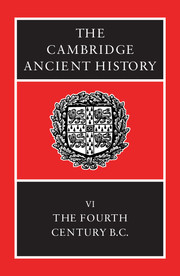Book contents
- Frontmatter
- 1 Sources and their uses
- 2 Sparta as victor
- 3 Persia
- 4 The Corinthian War
- 5 Sicily, 413–368 B.C.
- 6 The King's Peace and the Second Athenian Confederacy
- 7 Thebes in the 360s B.C.
- 8 Regional surveys I: Persian lands and neighbours
- 9 Regional surveys II: the West and North
- 9a Carthage from the battle at Himera to Agathocles' invasion (480–308 B.C.)
- 9b South Italy in the fourth century B.C.
- 9c Celtic Europe
- 9d Illyrians and North-west Greeks
- 9e Thracians and Scythians
- 9f The Bosporan Kingdom
- 9g Mediterranean communications
- 10 Society and economy
- 11 The polis and the alternatives
- 12 Greek culture and science
- 13 Dion and Timoleon
- 14 Macedon and north-west Greece
- 15 Macedonian hegemony created
- 16 Alexander the Great Part 1: The events of the reign
- 17 Alexander the Great Part 2: Greece and the conquered territories
- 18 Epilogue
- Chronological Table
- BIBLIOGRAPHY
- Index
- Map 1: Greece and Western Asia Minor
- Map 9: Egypt
- Map 20: Alexanders campaigns
- References
9d - Illyrians and North-west Greeks
from 9 - Regional surveys II: the West and North
Published online by Cambridge University Press: 28 March 2008
- Frontmatter
- 1 Sources and their uses
- 2 Sparta as victor
- 3 Persia
- 4 The Corinthian War
- 5 Sicily, 413–368 B.C.
- 6 The King's Peace and the Second Athenian Confederacy
- 7 Thebes in the 360s B.C.
- 8 Regional surveys I: Persian lands and neighbours
- 9 Regional surveys II: the West and North
- 9a Carthage from the battle at Himera to Agathocles' invasion (480–308 B.C.)
- 9b South Italy in the fourth century B.C.
- 9c Celtic Europe
- 9d Illyrians and North-west Greeks
- 9e Thracians and Scythians
- 9f The Bosporan Kingdom
- 9g Mediterranean communications
- 10 Society and economy
- 11 The polis and the alternatives
- 12 Greek culture and science
- 13 Dion and Timoleon
- 14 Macedon and north-west Greece
- 15 Macedonian hegemony created
- 16 Alexander the Great Part 1: The events of the reign
- 17 Alexander the Great Part 2: Greece and the conquered territories
- 18 Epilogue
- Chronological Table
- BIBLIOGRAPHY
- Index
- Map 1: Greece and Western Asia Minor
- Map 9: Egypt
- Map 20: Alexanders campaigns
- References
Summary
Our concern is mainly with the area which today comprises Epirus and north-western Macedonia in Greece, Albania and the Yugoslav cantons of Metohija and Kosovo. Its geographical features have been described in Vol. III.I, 619–24. In ancient times it was inhabited by southern Illyrian tribes and north-western Greek tribes. Our knowledge of them for the period c. 540 to c. 360 B.C. is derived from some fragments of Hecataeus and some passages in Strabo and from the findings of archaeology, especially in Albania. For the subsequent period, 360–323 B.C., there is more literary evidence, and something like a consecutive story can be told. This chapter is therefore divided chronologically into two parts.
THE ILLYRIANS c. 540–360 B.C.
The lakeland area holds a most important place in the south-west Balkans economically and strategically. Three parallel ranges, running north and south, enclose Lakes Ochrid, Prespa, Little Prespa and until recently Malik (now artificially drained); and these lakes, being more than 800 m above sea level, are exceptionally rich in fish and eels. The lowlands afford excellent arable land and pasture, and the mountains are forested and abound in game. Silver was mined in antiquity by the Damastini to the east and the north east of Lake Ochrid. The economic wealth of the area is somewhat obscured today by the fact that it is divided between three countries – the former Yugoslavia, Albania and Greece. Strategically it stands at the main crossroads of the southern Balkans. Communications from north to south, running through this high corridor, are very easy because there are no considerable rivers or mountains to cross.
- Type
- Chapter
- Information
- The Cambridge Ancient History , pp. 422 - 443Publisher: Cambridge University PressPrint publication year: 1994
References
- 1
- Cited by



